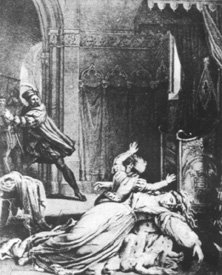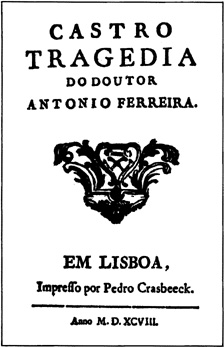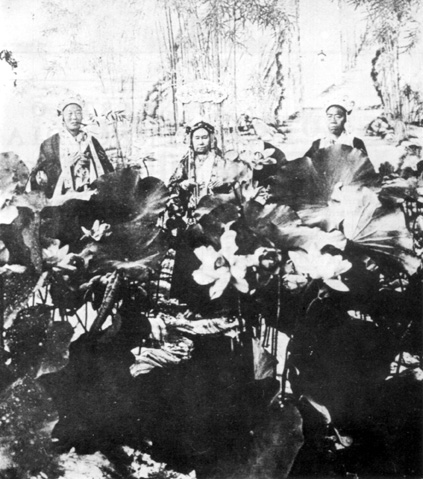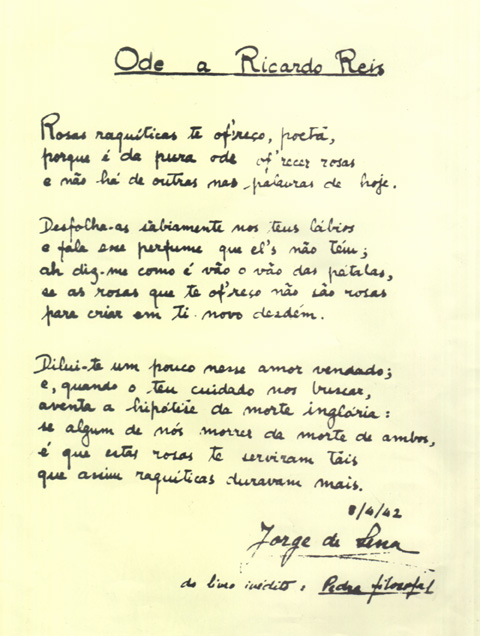Ever since I first read the story of Inês de Castro and whenever I think of her name, I immediately recall two other tragic heroines of love who were also victims of the state or of politics - Yang Guifei and Zhenfei.
Yang Guifei (719-756) was the favourite concubine of Tang Ming Huang (685-762), an emperor of the Tang Dynasty. Previously, she had been the Emperor's daughter-in-law. Her beauty and intelligence, however, awoke the passions of the Emperor and he sent her to a Taoist temple for a time so that she could become his concubine. In Chinese guifei (precious concubine) was the name given to the first concubine in the palace directly below the empress in the hierarchy of the Imperial Harem.
In ancient China, polygamy was institutionalized for emperors. In the Tang Dynasty, the emperor could have one "legitimate" wife, the empress; four fei (category 1 concubines) called guifei, shufei, defei, xianfei; nine pin (category 2); nine jeiyu (category 3;) nine meisen (category 4); nine cairen (category 5); twenty seven baolin (category 6); twenty seven yunu (category 8) as well as countless palace attendants. (2)
Of all those women, it was with Yang Guifei that Emperor Tang Ming Huang chose to live as man and wife. This was what Bai Ju Yi (772-846) referred to in his famous poem "Ode to Eternal Hatred", citing the situation of "three thousand beauties within the palace, three thousand loves in one alone"
Because of his love for Yang Guifei, the Emperor gave perks to the entire Yang family. Yang Guifei's father was endowed with the posthumous title of guogong (the greatest honour which could be given to citizens outside the imperial house). Her uncle was made a minister, a cousin became head of the protocol department and another cousin married the Emperor's daughter. Yet another cousin, Yang Guozhong, was promoted to the post of prime-minister and given the title of guogong. Three of her sisters were rewarded with the title of guofuran, the female equivalent of guogong.
Chinese tradition meant that families always preferred to have male children rather than female. According to Confucius: "Of the three sins against filial love, the worst is to bear no male children". The luck of the Yang family, however, altered contemporary predominant attitudes and people started to "prefer female to male children" ("Ode to Eternal Hatred").
 "The Assassination of Inês de Castro" by Desenne (in Os Lusíadas, a luxury edition by Morgado de Mateus).
"The Assassination of Inês de Castro" by Desenne (in Os Lusíadas, a luxury edition by Morgado de Mateus).
"Happiness always brings misfortune". Likewise, after sixteen years, great tragedy grew out of the joy shared by Yang Guifei and Tang Ming Huang. In 755, An Lushan, a powerful general of the Emperor's army, rebelled against the dynasty in the name of banishing all the ills of the country, meaning Yang Guozhong, the prime-minister, and Yang Guifei's cousin. As the rebellion neared the capital city, the Emperor fled in terror with his court, heading for Szechuan. When they arrived at Ma Wai Ting, nowadays in Shanxi Province, the escort refused to go any further. In their anger, they blamed the rebellion and their defeat on Yang Guifei and Yang Guozhong, condemning them to death. And so Yang Guifei was strangled to death.
Some scholars believe that it was Prince Li Heng who encouraged the soldiers to demand Yang Guifei's death in an attempt to consolidate his position as the legitimate heir and to widen his sphere of influence. According to tradition, she died without a whisper of complaint, out of her love for the Emperor. This formed the basis for Bai Yu Ji's Poem, "Ode to Eternal Hatred". (3)
After Yang Guifei's death, Tang Ming Huang offered the throne to Prince Li Heng and he was successful in quelling the revolt and regaining the capital.
After that, we only have legends to indicate what happened. Once he had returned to the city, Tang Ming Huang was shrouded in gloom and thought of his love day in and day out. A Taoist monk who was moved by his attitude, freed his spirit from his body and searched for Yang Guifei in Paradise, in Hell, in all the worlds. At last he found her - she was a goddess in a palace on Penglai Mountain (according to Chinese tradition, this is the home of the gods) in the Sea of the East.
Yang was missing her husband sorely. The Taoist monk then asked her to tell him a secret shared only by the lovers as proof that he had met her. Yang said that in the middle of the night of the seventh day of the seventh lunar month in the year 751, the night on which the Shepherd and the Weaver were allowed to meet each year, the rest of the year being spent in enforced separation by order of the Celestial Empress, she and Tang Ming Huang had sworn in the Hall of Longevity that they would be husband and wife throughout all their lives. The Taoist monk returned to Earth and told of his experience to Emperor Tang Ming Huang. He was so affected by this that he fell ill and passed away.
The love shared by Zhenfei (1876-1900) and Emperor Guangxu (1871-1908) was neither as romantic nor as complex as that of their predecessors, but it is nonetheless a poignant episode.
It is said that Emperor Guanxi (the penultimate ruler of China's imperial family) wanted Zhenfei for his Empress but the Empress Dowager forced him to marry her niece so Zhefei was relegated to the position of the Emperor's favourite concubine.
When he took the throne, Emperor Guangxu was still a child and the Empress Dowager was in complete control. In 1887, Guangxu began to shoulder some of the responsibilities but in fact everything remained under the stern hand of Cixi.
In 1898, Guangxu decided to introduce reforms into China but the Empress Dowager was stubbornly opposed to any changes. She still led the diehard traditionalist forces and Guangxu ended up imprisoned at the orders of Cixi.
 A rare edition of Castro (Inocêncio F. da Silva and Júlio de Castilho believe there is a mistake in the publishing date and that it was actually printed during the following century).
A rare edition of Castro (Inocêncio F. da Silva and Júlio de Castilho believe there is a mistake in the publishing date and that it was actually printed during the following century).
As Zhenfei was the fallen Emperor's favourite and had always supported him in his attempt to take over and introduce reforms, she became the target of Cixi's outrage. In 1900 when the foreign allies invaded Peking, Empress Dowager Cixi fled the city,ordering before her departure that Zhenfei be drowned in a well in the Forbidden City. Emperor Guangxu died a few years later, cut off from and disillusioned with life.
 The Empress Dowager Cixi (1835-1908) posing as the Buddhist Goddess of Mercy. The famed head eunuch, Li Lien-Ying, is to her right. It is believed that it was she who gave the command or order for Zhenfei's execution.
(Photograph attributed to Princess Der Ling).
The Empress Dowager Cixi (1835-1908) posing as the Buddhist Goddess of Mercy. The famed head eunuch, Li Lien-Ying, is to her right. It is believed that it was she who gave the command or order for Zhenfei's execution.
(Photograph attributed to Princess Der Ling).
In Chinese history, it has been common to accuse women of being the ruin of the country in attempts to justify certain historical incidents. The truth is, however, that beautiful women have been primarily the victims of political manoeuvers and scapegoats for the ambitions and fights of others, as can clearly be seen by the two tragedies cited here.
It is worth noting the analogy between the different histories of the two countries, China and Portugal. The great Chinese writer, Lu Xun, said: "Only despicable men throw the blame for failure and defeat onto women. Women have taken the blame for everyone's mistakes for too long".
Inês de Castro, like Yang Guifei and Zhenfei, committed no greater crime than possessing great beauty and being the object of the love of princes, kings and emperors. Although they were connected through their love to the affairs of state, and despite the fact that politics, like love, is a game of war which sometimes demands a human victim, there is still no excuse for those who were truly responsible to be exculpated and for these women to carry the blame. The most striking aspect of these incidents involving Inês de Castro, Yang Guifei and Zhenfei is the abuse of nepotism which took place, accompanied by subsequent threats and corruption. Everyone manages to save their skin while the women pay the price. This is the injustice which imbues tragedy with such poetic charge.
The tragic outcome of Inês de Castro's love for D. Pedro has proved an inspiration for great artists and writers in all fields (for instance, Camões' famous couplets in The Lusiads, António Ferreira's "Castro" and Henry de Montherlant's "La Reine Morte"). Likewise, the tragic story of Yang Guifei has been one of the most fertile themes of Chinese literature, providing the backdrop to Hong Sheng's famous play The Hall of Longevity and Bai Ju Yi's poem "Ode to Eternal Hatred", both of which include Chinese history, legend and folktales in their versions of the drama. Of the wide variety of works produced in connexion with Zhenfei's tragic love, the most famous is The Secret History of the Qing Palace.
Both in Portugal and in China, from intellectuals to the common people, the affection felt for their respective heroines is enormous. The memories of these women have been transformed into a collective myth and constitute a constant source of heartfelt, lasting emotions.
Inês de Castro's tomb in Alcobaça, the spa which Tang Ming Huang had built for Yang Guifei in the old Huaqing Palace (near Xian) and the well in the Imperial Palace where Zhenfei was drowned all bear witness to the lives of the three heroines and are the objects of visits and the sympathies of thouands of tourists each year.
Small consolation for such unlucky victims of love.
Translated by Marie Imelda MacLeod

NOTES
(1)EN- The poignant story of Inês de Castro is probably the best known tragedy of love in Portuguese history. For the benefit of non-Portuguese readers who may not be familiar with Portuguese history, the story of this lady is indeed very moving. The love that she and D. Pedro shared awoke strong opposition for political and moral reasons. Possibly the greatest fear of King D. Alfonso IV, father of D. Pedro, was that his son's marriage to this lady would result in an un wanted alliance with Spain which he feared would bring disaster to Portugal. Therefore, he ordered the murder of Inês de Castro and her children, whilst D. Pedro was away on a hunting trip.
(2)E. N. - The total number of concubines and their classification and numbers of each kind in each class was carefully calculated in ancient China. According to Taoist theory, they were ranked within a pyramid system which was closely linked both to the lunar calendar and to erotic symbolism and metaphysics. The emperor was thus entitled to a limited number of concubines which decreased according to how high up the "pyramid" they were ranked. Everything was organized in harmony with the number "9", a number which frequently appears in Chinese (and also Western) esotericism. The four fei could serve the emperor on the days immediately prior to the full moon. The night of the full moon was reserved solely for the empress.
Following certain rules and formulae, the imperial union was a symbol of the joining of a male element (yang) with a female (ying), the Sun (the emperor was the son of the Sun) with the full moon (the empress was the female archetype).
(3)E. N. - With regard to this reference to a poem by Bai Ju Yi mentioning Yang Guifei's situation, we would like to print the second part of the poem "Songs for Peonies" by Li Bai with notes by António Graça de Abreu:
II
A bunch of exquisite, beautiful flowers,
Sweetly shaded by the morning dew.
An incomparable night of love
on the Mountain of the Enchanted woman,
Where all suffering is in vain.
I ask, who can be like her in the Palace of the Han?
How can we not lament the "Flying Swallow"
that can only depend on its adornments?
The following story has generally been accepted by Chinese historians as an explanation of the poem:
"Emperor Xuanzong was with Yang Guifei, the favourite concubine in the palace grounds. They were picking peonies, a flower which had recently been imported from India, when Xuanzong called for Li Bai and requested him to compose a poem. Li Bai arrived in a drunken state and he had to be revived with cold water. Straight away, he composed three verses which proved to be one of the reasons he was banished from the court. The influential eunuch, Gao Lishi must have convinced Yang Guifei that Li Bai had compared her with Zhao Feiyen, the famous "swallow who could dance in the palm of a hand". Feiyen was a courtesan and later on the favourite concubine of Emperor Cheng, in the first century A. D. She committed suicide after she was abandoned by the Emperor. Yang Guifei treated the comparison as an insult and prepared her revenge by getting Li Bai dismissed from the court.
Arthur Waley, one of the first great English translators of Chinese poetry, refutes this claim, basing his opinion on Chinese sources which prove that in 745, when Yang Guifei was given the position of favourite concubine, Li Bai no longer lived in the Imperial Palace."
* Portuguese lecturer at the University of International Studies in Shanghai (Portuguese Department). A researcher of Portuguese culture, she, presently holds an ICALP scholarship and is preparing a Chinese translation of Camilo Castelo Branco's A Queda de um Anjo.
start p. 104
end p.